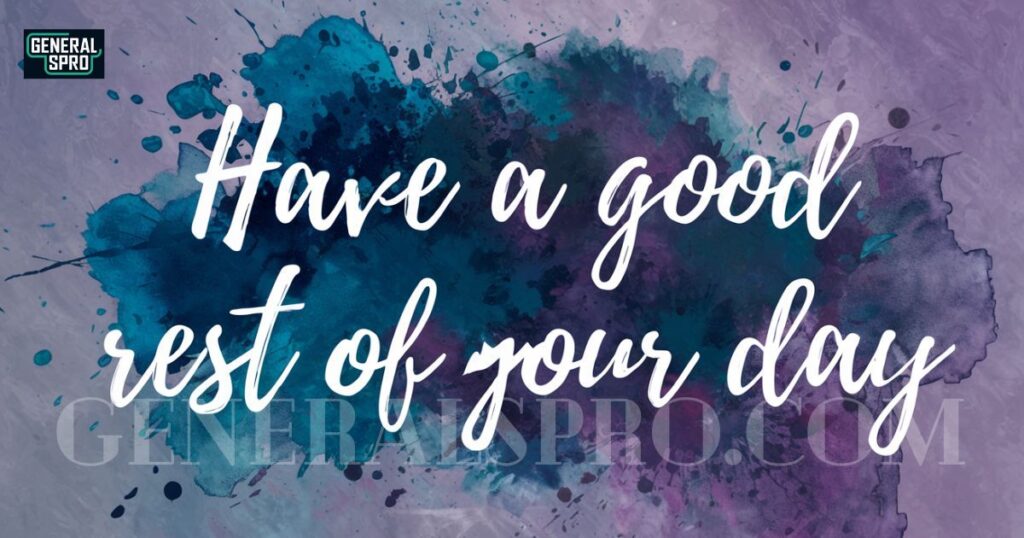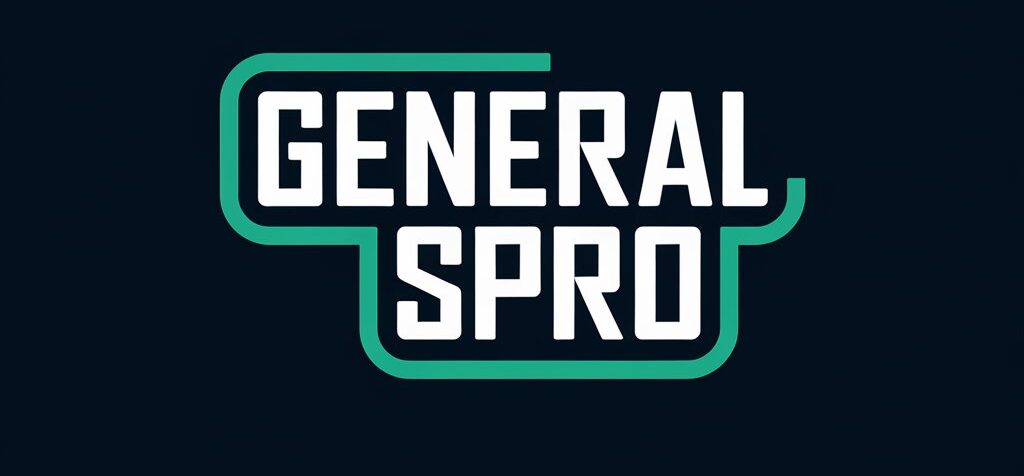In our fast-paced world, how we bid farewell can leave a lasting impression. While “have a good rest of your day” serves its purpose, numerous creative and heartfelt alternatives can make your goodbyes more memorable.
Whether concluding a business meeting or wrapping up a casual conversation, choosing the correct farewell phrase can strengthen relationships and showcase your communication skills.
What to Say Instead of “Have a Good Rest of Your Day”

Professional sign-offs and friendly closing phrases don’t need to feel formulaic. Let’s explore fifteen thoughtful alternatives that can help you positively end conversations, from casual goodbye alternatives to more formal end-of-day wishes.
Enjoy the Rest of Your Day
This warm and straightforward expression works perfectly in both professional and casual settings. It maintains politeness while adding a personal touch that shows genuine care for the other person’s well-being.
When a retail associate says, “Thank you for shopping with us—enjoy the rest of your day!” it creates a more meaningful connection than a simple goodbye.
Make the Most of the Rest of Your Day
This alternative phrase carries an encouraging tone that empowers the recipient. It’s particularly effective when used after productive meetings or positive interactions.
For instance, “Thanks for your valuable input in today’s meeting – make the most of the rest of your day!” This uplifting end-of-day message motivates while maintaining professionalism.
Hope Your Day Continues to Be Great
This phrase works wonderfully when you’ve had a positive interaction and want to maintain that energy.
It acknowledges the quality of your exchange and extends good wishes forward. In customer service settings, you might say, “I’m glad I could help resolve your concern – I hope your day continues to be great!”
Have a Wonderful Remainder of the Day
This slightly more formal variation suits professional environments while still conveying warmth. It’s perfect for business emails or after client meetings: “Thank you for your time today – have a wonderful remainder of the day.”
Wishing You a Pleasant Day Ahead
This expression works exceptionally well in written communication and formal settings. It conveys professionalism while maintaining a friendly tone. Example: “I look forward to our next discussion. Wishing you a pleasant day ahead.”
The Psychology Behind Farewell Phrases
Understanding the impact of our parting words reveals fascinating insights into human psychology. Research suggests that final interactions significantly influence how people remember entire conversations.
When we choose thoughtful closing phrases, we activate positive emotional responses in both the speaker and recipient, creating lasting impressions beyond immediate interaction.
Cultural Variations in Saying Goodbye
Different cultures approach farewells with unique traditions and linguistic patterns. In Spanish-speaking countries, “Que tengas un buen día” carries subtle nuances distinct from its
English counterpart. Japanese culture emphasizes the importance of proper farewells through phrases like “よい一日を” (you Shinichi wo), reflecting their society’s attention to social harmony and respect.
The Evolution of Professional Closings
Business communication has transformed significantly in the digital age. Traditional closings like “Yours Truly” have given way to more personalized yet professional alternatives.
Modern workplace culture values authenticity while maintaining appropriate boundaries, leading to the development of new farewell expressions that balance warmth with professionalism.
Impact of Tone on Written Communications
The written word lacks vocal inflection and body language, making tone especially crucial. Email closings and digital messages require careful consideration to convey the intended meaning accurately.
Studies show that recipients interpret digital farewells differently based on punctuation, capitalization, and word choice.
Building Rapport Through Farewell Messages

Strategic use of closing phrases can strengthen professional relationships. Personalizing farewells based on shared experiences or previous conversations demonstrates attentiveness and builds trust. This approach transforms routine goodbyes into opportunities for relationship development.
Time-Specific Farewell Expressions
The time of day significantly influences appropriate farewell choices. Morning partings emphasize productivity, while afternoon goodbyes focus on relaxation or completion. Understanding these temporal contexts helps select more appropriate closing phrases.
Industry-Specific Farewell Protocols
Different sectors maintain distinct communication norms. Healthcare professionals might emphasize wellness in their goodbyes, while sales representatives often include action-oriented closings. Understanding industry expectations helps tailor farewell messages appropriately.
Digital Platform Considerations
Social media, email, and messaging platforms each require different farewell approaches. Platform-specific etiquette has evolved and is influenced by character limits, user demographics, and communication purposes.
Understanding these nuances ensures appropriate closing choices across digital channels.
The Role of Empathy in Farewells
Emotional intelligence plays a crucial role in selecting appropriate goodbyes. Reading social cues and understanding context helps choose closings that resonate with recipients’ emotional states and circumstances.
Generational Preferences in Closing Phrases
Different age groups often prefer distinct farewell styles. While Baby Boomers might appreciate traditional closings, Generation Z tends toward more casual, emoji-enhanced expressions. Understanding these preferences helps navigate intergenerational communication effectively.
Non-Verbal Elements in Farewell Messages
Body language, timing, and delivery significantly impact farewell effectiveness. Physical cues like smiles, eye contact, and posture complement verbal goodbyes, creating more meaningful interactions.
Seasonal and Contextual Adaptations

Farewell phrases often reflect seasonal contexts or exceptional circumstances. Holiday periods, challenging times, or celebratory moments require modified closing expressions that acknowledge these situations.
Emergency and Crisis Communication Closings
Difficult situations demand carefully chosen farewells. During emergencies or sensitive periods, closing phrases should balance professionalism with empathy and reassuring while maintaining appropriate boundaries.
Technology’s Impact on Farewell Traditions
Artificial intelligence and automated responses are reshaping how we say goodbye. Understanding the balance between automation and personal touch helps maintain meaningful human connections in an increasingly digital world.
Future Trends in Farewell Communications
Emerging communication technologies and evolving social norms continue to influence farewell expressions.
Virtual reality meetings, augmented reality interactions, and new social platforms may introduce novel ways of concluding conversations, requiring adaptability in farewell choices.
FAQ’s
What’s the right time for saying, “Have a good rest of your day”?
This phrase works best after midday or when concluding an interaction that won’t resume until tomorrow. It’s particularly effective in professional settings when you know you won’t see the person again that day.
Should I use this phrase in formal business communications?
While acceptable in verbal business interactions, formal written communications might benefit from more traditional closings like “Best regards” or “Sincerely.” The level of formality should match your relationship with the recipient.
How can I make this phrase sound more personal?
Add specific details relevant to your conversation or the person’s plans: “Have a good rest of your day at the conference” or “Hope the rest of your day goes well with your presentation.”
Is this phrase appropriate for international business communications?
The phrase translates well conceptually across many cultures, but consider cultural norms and time zones. What’s the “rest of the day” for you? It might be “good morning” for someone else.
Can I use this phrase in digital messages?
It works well in emails, instant messages, and video call conclusions. Just ensure the timing makes sense – avoid using it in messages that might be read the next day.
What’s the difference between “Have a good rest of your day” and “Have a good day”?
The former acknowledges that part of the day has already passed and wishes well for the remaining portion, while the latter is a more general greeting suitable for early-day interactions.
How can I avoid overusing this phrase?
Rotate through different variations and alternatives based on the situation and relationship. This keeps your communications fresh and more meaningful.
Is it appropriate to use this phrase when ending challenging conversations?
Yes, it can help end difficult discussions on a positive note, showing professionalism and goodwill regardless of the conversation’s content.
Conclusion
The art of saying goodbye deserves more attention than it often receives. Expanding your repertoire of farewell phrases can make your daily interactions more meaningful and memorable.
Whether seeking professional closing statements or casual ways to end a conversation, these alternatives to “have a good rest of your day” provide options for every situation.
Remember that the most effective farewells match the situation and your relationship with the other person. Through thoughtful word choice, you can ensure that your parting words leave a positive, lasting impression.








